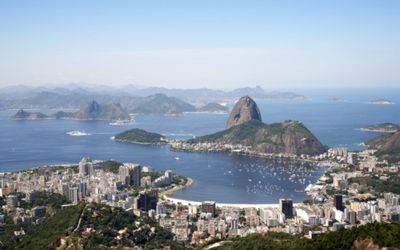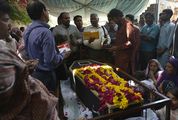Heed the warning of Brazil’s model for growth
by Lyal White,
2013-10-29 05:32:28.0
SOUTH Africans are enamoured of Brazil. A similar melting pot of cultures and colours, Brazil boasts the second-largest black population in the world after Nigeria. Brazil also faces enormous socioeconomic challenges. These dynamics have made Brazil’s response and relative progress in recent years appealing to South Africa’s policy makers and planners.
But three years after Brazil emerged as a leading light of progressive development, the economy is grinding to a halt and its development model comes with a serious warning.
In 2010, Brazil recorded impressive economic growth of 7.7% and brought more than 50-million people into the middle class through targeted social programmes, increased productivity and job creation over 15 years. Most significant, Brazil displayed a refreshing sense of confidence, bound by a strong consensus between the government, business and the unions, towards a common vision. "The country of the future", as it became known, had arrived.
Today, the situation is very different. Unable to repeat the growth spurt of 2010, the Brazilian economy grew by just 0.9% last year and the "new middle class" is protesting with greater frequency and in larger numbers then ever before.
In May and June this year, more than a million people took to the streets of major cities across the country, demanding better service delivery, improved infrastructure and political reform to address the problems of poor planning and corruption that have hamstrung Brazil for so long. The middle-class protests have highlighted three constraints to development and the underlying reality in Brazil.
First, the infrastructure deficit. Despite talk about reconstruction and maintenance, relatively little has been done to improve ports, rail and airports since the 1980s. According to the McKinsey Global Institute, Brazil’s stock of infrastructure as a percentage of gross domestic product (GDP) is less than a third of the average for so-called large economies, but still Brazil dedicates just 1.5% of GDP compared with the global average of 4%. Without proper infrastructure, Brazil will never realise its true potential given its primary sources of wealth are in food production and resource extraction.
The second impediment is the large Brazilian state, its pension systems and social programmes. These pose a huge cost, which has become more relevant with the end of the commodity boom, as growth and productivity have dipped.
Described as a "bloated state", the Brazilian cabinet has 39 ministries and the number of state-owned enterprises has increased since 2000 from about 90 to more than 120, with more than 100,000 new employees. This comes with a generous pension scheme that essentially provides for recipients (and spouses) for a longer period than they are actively at work and is unsustainable as Brazil becomes an ageing population.
Along with large social programmes, the situation puts severe strain on public finances. This has been amplified by poor planning and corruption.
The third prevailing concern is that the business environment in Brazil is riddled with complexity. The tax system is said to be the most burdensome in the world. According to the World Bank’s ease of doing business index, Brazil ranks 130th out of 185 countries. Nigeria is in 131st position and South Africa comes in at 39. Under these constraints, Brazil has become more protective and interventionist in recent years. This has raised costs and undermined efficiency. Brazilian exports are just 12.5% of its GDP.
In short, Brazil is in desperate need of reforms. Political institutions and many of the legacies of the past need to be revisited to develop a leaner and stronger state system. Real efforts to curb public spending and build competitiveness by addressing constraints to business are well overdue. The emerging middle class, which now represents half of the population of Brazil, has recognised this and is pushing for change.
We have much to learn from Brazil. But its model of development, now in question, appears to be less applicable to South Africa’s context than originally thought. We, too, need to build a middle class and combat inequality. But what Brazil shows us is that this is unsustainable in an environment that is not open and connected and where competitive business is unable to flourish.
• White is the director of the Centre for Dynamic Markets at the Gordon Institute of Business Science.

Rio de Janeiro, Brazil. Picture: THINKSTOCK
SOUTH Africans are enamoured of Brazil. A similar melting pot of cultures and colours, Brazil boasts the second-largest black population in the world after Nigeria. Brazil also faces enormous socioeconomic challenges. These dynamics have made Brazil’s response and relative progress in recent years appealing to South Africa’s policy makers and planners.
But three years after Brazil emerged as a leading light of progressive development, the economy is grinding to a halt and its development model comes with a serious warning.
In 2010, Brazil recorded impressive economic growth of 7.7% and brought more than 50-million people into the middle class through targeted social programmes, increased productivity and job creation over 15 years. Most significant, Brazil displayed a refreshing sense of confidence, bound by a strong consensus between the government, business and the unions, towards a common vision. "The country of the future", as it became known, had arrived.
Today, the situation is very different. Unable to repeat the growth spurt of 2010, the Brazilian economy grew by just 0.9% last year and the "new middle class" is protesting with greater frequency and in larger numbers then ever before.
In May and June this year, more than a million people took to the streets of major cities across the country, demanding better service delivery, improved infrastructure and political reform to address the problems of poor planning and corruption that have hamstrung Brazil for so long. The middle-class protests have highlighted three constraints to development and the underlying reality in Brazil.
First, the infrastructure deficit. Despite talk about reconstruction and maintenance, relatively little has been done to improve ports, rail and airports since the 1980s. According to the McKinsey Global Institute, Brazil’s stock of infrastructure as a percentage of gross domestic product (GDP) is less than a third of the average for so-called large economies, but still Brazil dedicates just 1.5% of GDP compared with the global average of 4%. Without proper infrastructure, Brazil will never realise its true potential given its primary sources of wealth are in food production and resource extraction.
The second impediment is the large Brazilian state, its pension systems and social programmes. These pose a huge cost, which has become more relevant with the end of the commodity boom, as growth and productivity have dipped.
Described as a "bloated state", the Brazilian cabinet has 39 ministries and the number of state-owned enterprises has increased since 2000 from about 90 to more than 120, with more than 100,000 new employees. This comes with a generous pension scheme that essentially provides for recipients (and spouses) for a longer period than they are actively at work and is unsustainable as Brazil becomes an ageing population.
Along with large social programmes, the situation puts severe strain on public finances. This has been amplified by poor planning and corruption.
The third prevailing concern is that the business environment in Brazil is riddled with complexity. The tax system is said to be the most burdensome in the world. According to the World Bank’s ease of doing business index, Brazil ranks 130th out of 185 countries. Nigeria is in 131st position and South Africa comes in at 39. Under these constraints, Brazil has become more protective and interventionist in recent years. This has raised costs and undermined efficiency. Brazilian exports are just 12.5% of its GDP.
In short, Brazil is in desperate need of reforms. Political institutions and many of the legacies of the past need to be revisited to develop a leaner and stronger state system. Real efforts to curb public spending and build competitiveness by addressing constraints to business are well overdue. The emerging middle class, which now represents half of the population of Brazil, has recognised this and is pushing for change.
We have much to learn from Brazil. But its model of development, now in question, appears to be less applicable to South Africa’s context than originally thought. We, too, need to build a middle class and combat inequality. But what Brazil shows us is that this is unsustainable in an environment that is not open and connected and where competitive business is unable to flourish.
• White is the director of the Centre for Dynamic Markets at the Gordon Institute of Business Science.























Change: -0.47%
Change: -0.57%
Change: -1.76%
Change: -0.34%
Change: 0.02%
Data supplied by Profile Data
Change: -1.49%
Change: -0.01%
Change: -0.47%
Change: 0.00%
Change: -0.08%
Data supplied by Profile Data
Change: 0.61%
Change: 0.85%
Change: 0.20%
Change: -0.22%
Change: 0.82%
Data supplied by Profile Data
Change: 0.27%
Change: -0.42%
Change: 0.13%
Change: -1.22%
Change: -1.88%
Data supplied by Profile Data